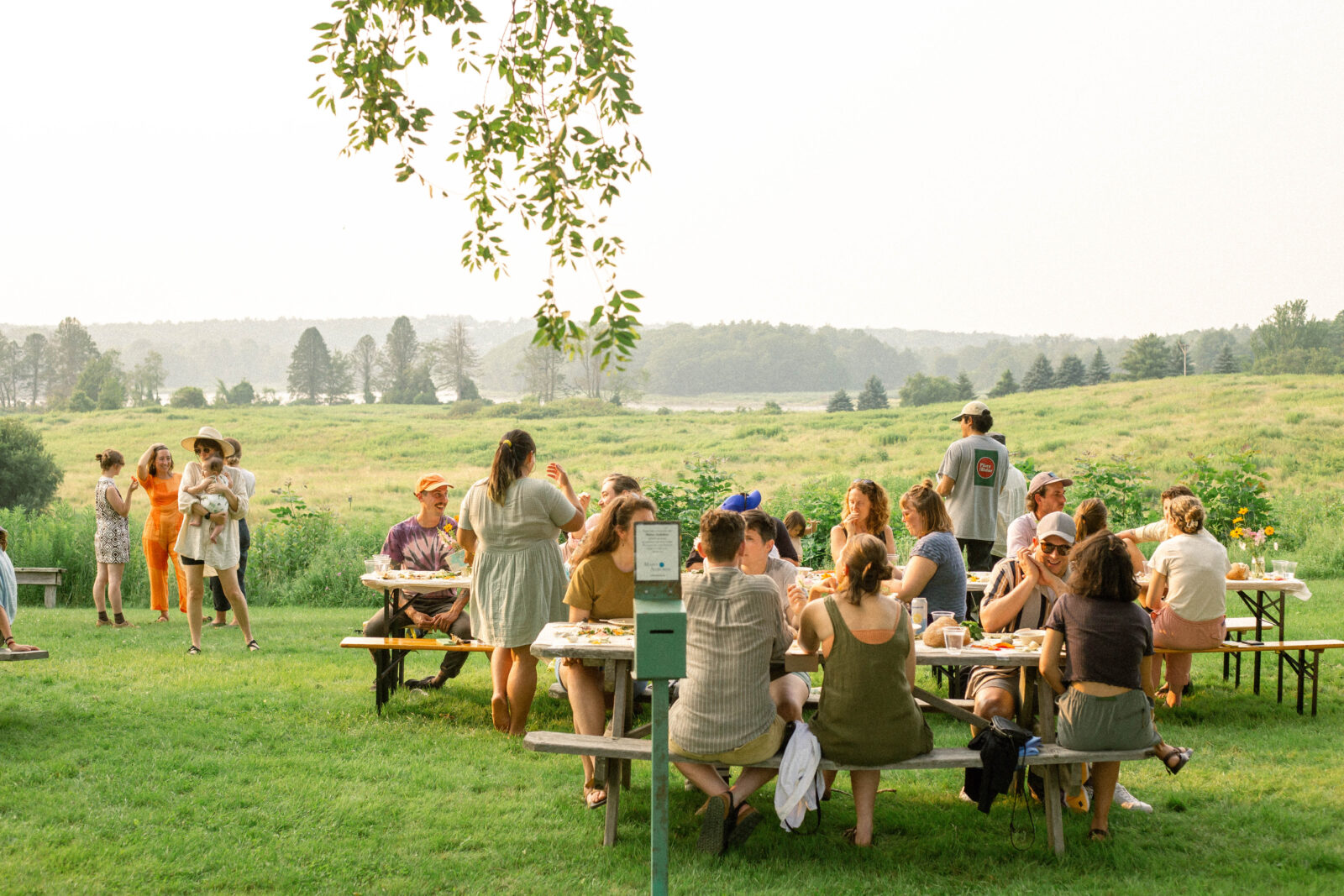Jenny Ibsen’s fish picnic is a fish-forward banquet inspired by eating side-by-side with strangers and loved ones, sharing stories across the table as loaves of bread get passed back and forth, and the cold, salty ocean that we’re so lucky to have access to in Maine. It is a creative, free, public meal series that will happen once every few months with all seasonal foods prepared by Jenny Ibsen. Though it’s a food-centric gathering, this non-traditional feast takes the form of a vessel to share community at the table with one another.
Ibsen’s project is a 2023 Kindling Fund project grantee, supplementing partial funding of the project budget from an American Rescue Plan Maine Project Grant.
On Maine’s first sunny day of summer, I sat down with Jenny Ibsen to talk about her series of dinners.
C: Tell me about fish picnic.
J: I hosted my first fish picnic last September with Gabriel Chalfin-Piney’s Kindling Fund grant for Care-Full Histories, a roving dinner series featuring several Maine artists. It was at Fort Williams, just before sunset, since they close at sunset.
C: Yes, they come around with an alarm. It’s awful.
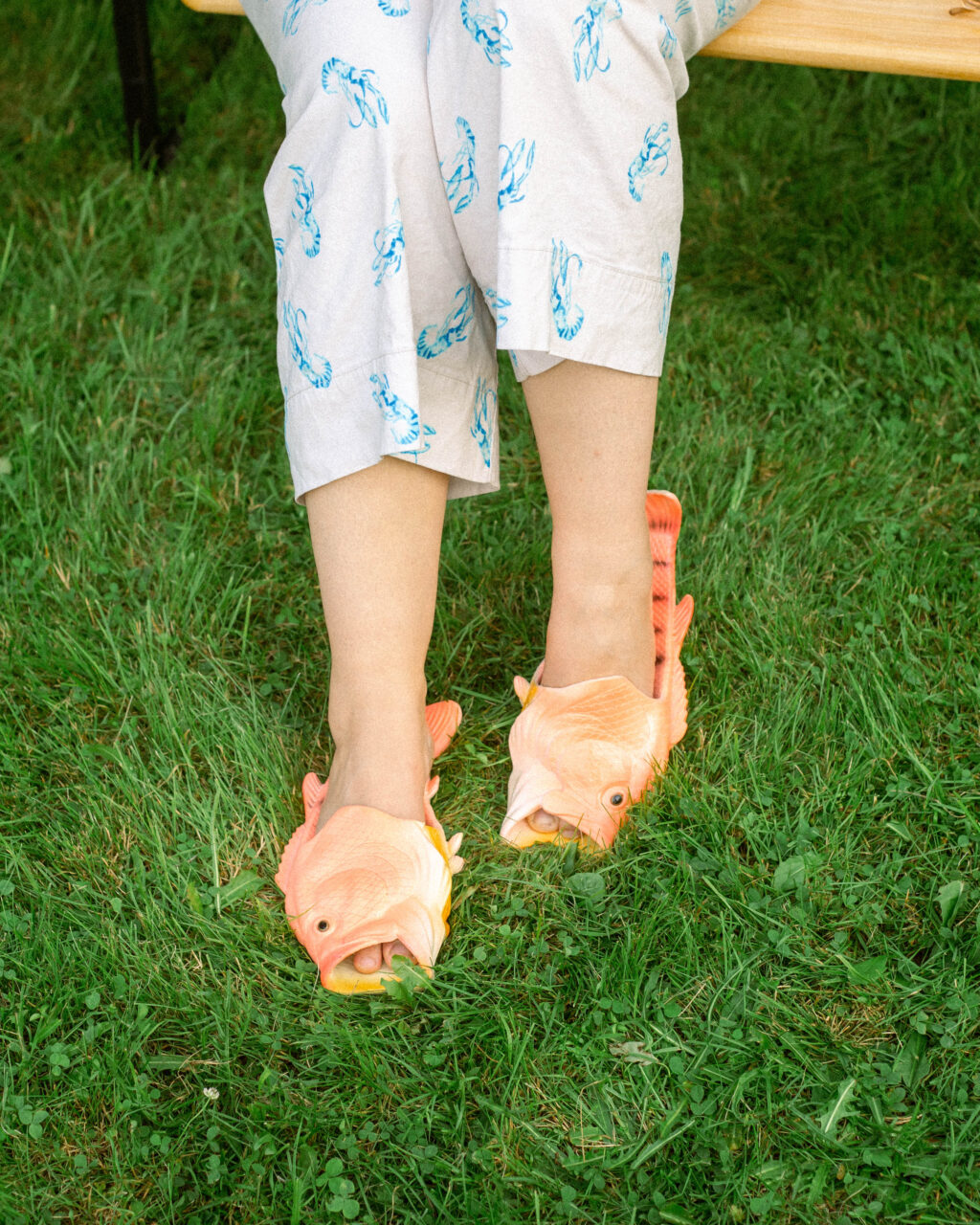
J: I’m hoping to kind of recreate that dinner where it feels very casual, while also being free and accessible. One of the main components of the dinner is these tables of tablecloths. I plate directly onto the table, which gets all these nice stains under the cloth. I’ve been thinking of every meal as a piece of print work. Hopefully, someday I’ll do something with all of them. They all represent different time markers of moments.
I try to take advantage of all the things that Maine has to offer in the summer. Living in Maine, everyone’s so attuned to food concerning the time of year. People will be like Oh, now it’s strawberry season, or it was just rhubarb season and we feel phases of growth in that way. I love that, and I’m trying to do some food-related things according to the season.
C: I saw that you have a Scandinavian background. I’m also Scandinavian; my mom is from Denmark. And I feel like Scandinavia and Maine have a lot of intersections. So, I was just wondering where you find intersectionality and how your background helped you inspire it.
J: It’s kind of loosely inspired by that. I was born in China and was adopted. My dad’s side is Norwegian and Danish. My mom’s side is also Norwegian and Swedish. I guess we are obsessed with fish. And I think that’s the main Scandinavian-Maine connection. I don’t know. I feel like that draws a lot of parallels.
C: What do you think about the impact of creating something that’s more ritualistic and temporary instead of more permanent art? Something that’s kind of more rooted in an experiential thing, rather something you would see in a gallery.
J: Wow, I love that question. It’s nice when other people give you new ways to think about your work. I don’t know, I feel weird calling fish picnic a performance, because I wouldn’t ever consider myself a performance artist, but it is in a way. What I love about it is that it’s a meal, which is an experience. I’m creating the vessel, the environment, and then things happen around it organically. People like to feel things organically and make connections during the meal. A lot of my practice is community-driven. Whenever I am alone and trying to make things, I struggle a lot more. I thrive when I’m able to communicate, critique, and exchange ideas with people. People can be moved to get great experiences out of static objects and feel a connection to them, it’s more tangible when you’re actively experiencing it.
I work in restaurants. I’ve worked in the service industry since before I was in college. Especially in Portland, where everyone is so ‘foodie’, everyone’s very tapped into the restaurant scene, which sometimes feels inaccessible. It’s expensive, and often doesn’t feel like the industry is actually able to serve its own workers. In some way, fish picnic is reclaiming those actions that I do for work- for free-but instead, it comes from my art practice more intentionally.
C: Is it ever difficult to describe fish picnic? I feel in the dance world, you can have issues where if something is way more abstract and not a physical piece of art, people get really confused. Maybe it’s about what you’re talking about before, the experience of it all. And the process of going somewhere and feeling whatever you feel, sharing food and ideas with others.
“People can be moved to get great experiences out of static objects and feel a connection to them. it’s more tangible when you’re actively experiencing it.”
Jenny Ibsen
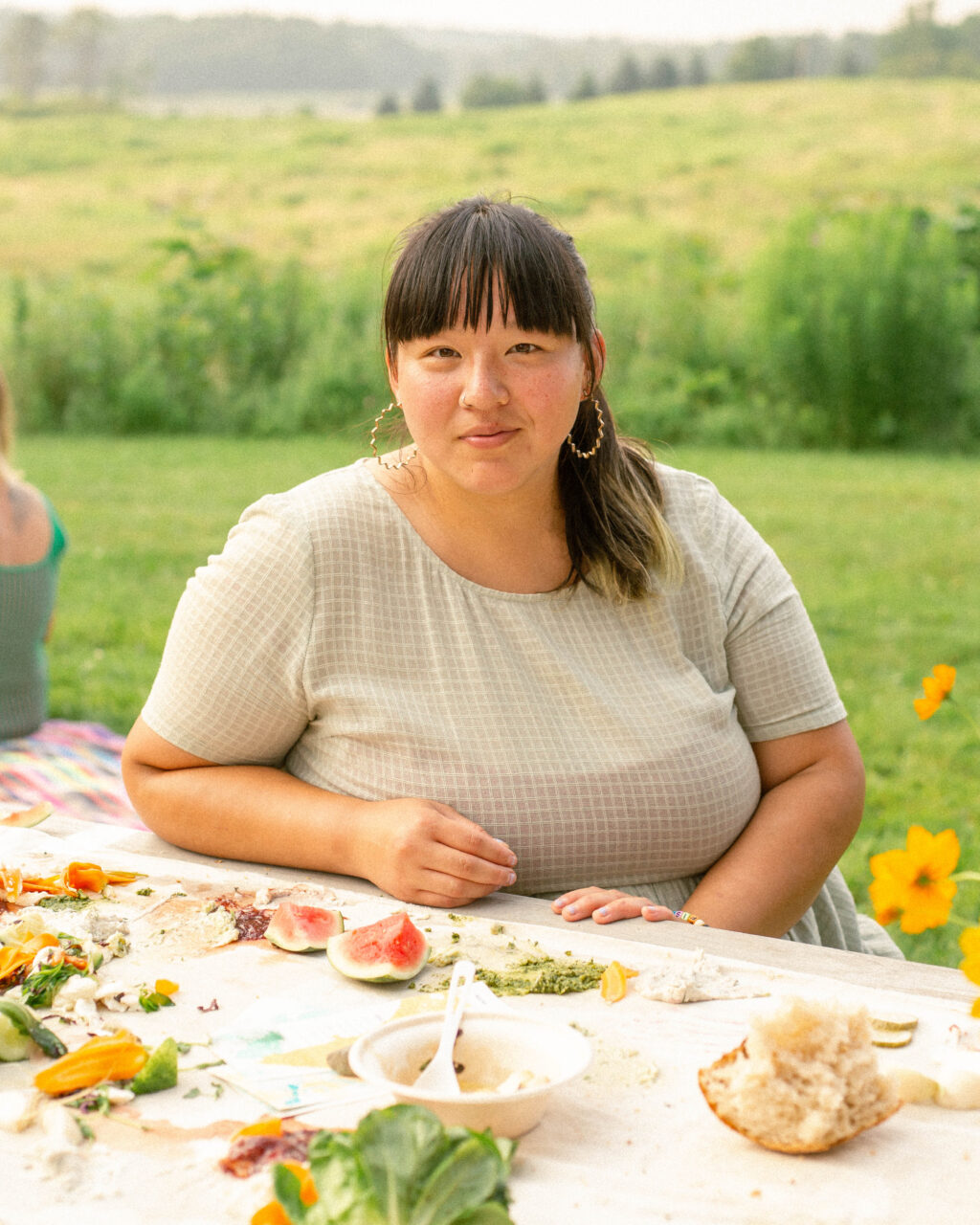
J: So hard. I mean, I think it’s just a meal. And I think that’s why I like it because it’s just a meal, but also a little bit more than that.
C: And it doesn’t have to be a lot more than that.
J: Especially coming out of COVID—or even before COVID—I haven’t had that many meals where I’m sitting at the same table with a bunch of people I don’t know. And being like, Oh, here take this bread loaf out of my hands. And so there’s this lovely, communal aspect as if we’re all signing up to be there together and experience this thing together. And that’s what sets it apart from going out to eat, or eating at a wedding, where there’s nice catered tables or assigned seats. I mean, it’s funny, because all the places that I’ve been interested in having fish picnic are wedding venues, because I’m like, Oh, this place is pretty and accessible, and there’s a bathroom and a nice barn if it rains, but then I realize it’s also a wedding venue…
C: Fort Williams was a great place for it. It’d be interesting if you went somewhere that didn’t have a time restraint. Because maybe it would last for like, six hours.
J: I know. And I’m kind of hoping to do that. It’s also providing a way for people to engage however they want. At Fort Williams last year, we ran out of time because of the sunset, but I wanted to go swimming. I was just at the Audubon in Falmouth this morning. That’s where the July dinner is, and they have all these trails and it’s free. It’s so beautiful.
C: How concerned are you with the aesthetics of fish picnic versus the experience itself?
J: The aesthetics of it are important. I’m trying to choose beautiful places that are ocean-adjacent because being connected to the water is important to me, and important to the meal. I think having an ocean view is beautiful. It also creates the right environment. In the way that when you go to restaurants and the food is plated nice. I’m trying to do that but thinking of the table as a big canvas. And so last year, I think I’m going to incorporate the plating moment as part of the entrance to the dinner. I want it to be colorful and balanced, like putting beets and things just to make the table prettier. I want it to feel bountiful and colorful. It’s nice to just have those things at a free event. It’s nice to feel plentiful even if you’re not paying for something.
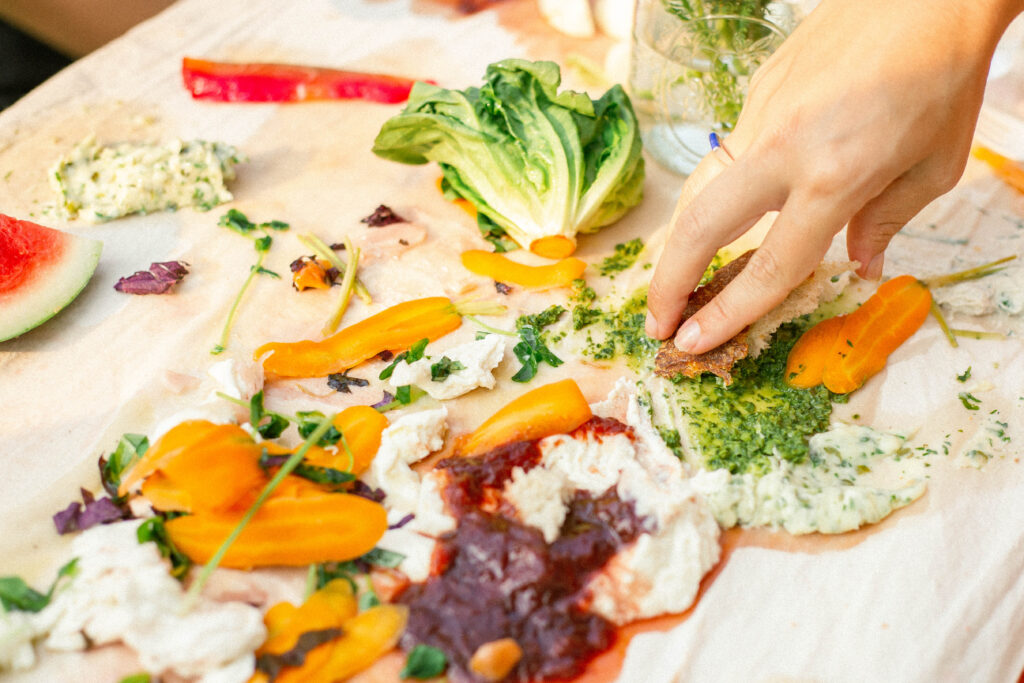
C: Okay, thoughts on utensils.
J: *laughs* Utensils will be there. Everyone’s going to have compostable forks and plates. I thought about this a lot last year for logistics. But if I’m putting all this stuff on the table, it’s like, do you just eat right off the table? But it was funny, I feel like at my first dinner, the whole table was very full and then people would eat at these little holes and then move somewhere else on the table. Thankfully we ended up eating all the food. Everyone was stuffed. But yeah, utensils would be there, but serving utensils will not be there.
C: Who or what has been a big artistic inspiration for you in the last year?
J: There’s this ceramicist I’ve been obsessed with on Instagram, Michelle Im. And I have this huge Instagram crush on her. I’m going to a residency that she’s going to be at in Maine in August, and so I’m very excited to meet her. Her work has a lot of similar vibes to fish picnic: colorful, whimsical, and awesome tableware things. Her work has a cast of characters and the ceramics are all functional but also silly…which is the vibe that I’m going for. It’s aesthetic and it’s functional.
C: If you could invite one celebrity, who would it be? Who would be there?
J: Maybe Samin Nosrat. Did you read or watch Salt Fat Acid Heat?
C: No, but my dad has that book.
J: The book and show are both beautiful. She had this podcast called Home Cooking, where people would write in questions and she would answer them and they’d be like, I have 300 pounds of jalapeños. What do I do with them? And she’s like, Oh, that’s a great question. She’s very casual and down-to-earth about her relationship to food. And it’s nice having people that aren’t pretentious be leading examples in the food world.
C: How do you see fish picnic evolving in the future?
J: I’m so excited for it to evolve. I think that one way that it’s growing is that I wanted this to be a summer event, but I think I’m going to have one in July, one in September, and one in the winter. I’m excited to see how a winter fish picnic will go. Should I cave and do it inside? Or should I just do it outside on the beach in the snow?
I also want it to stay free (but I’m going to offer sliding-scale tickets if people want to donate). And then if I make enough money from that I could host more dinners. I’m drawn towards the idea of it just being on my own time, being more fun and less intense. People have asked me if I considered having a specific space for pop-ups. But I feel the whole point is that it just happens sporadically. Because then people are waiting and being like, Oh, where’s it going next?
C: Yeah, myself included.
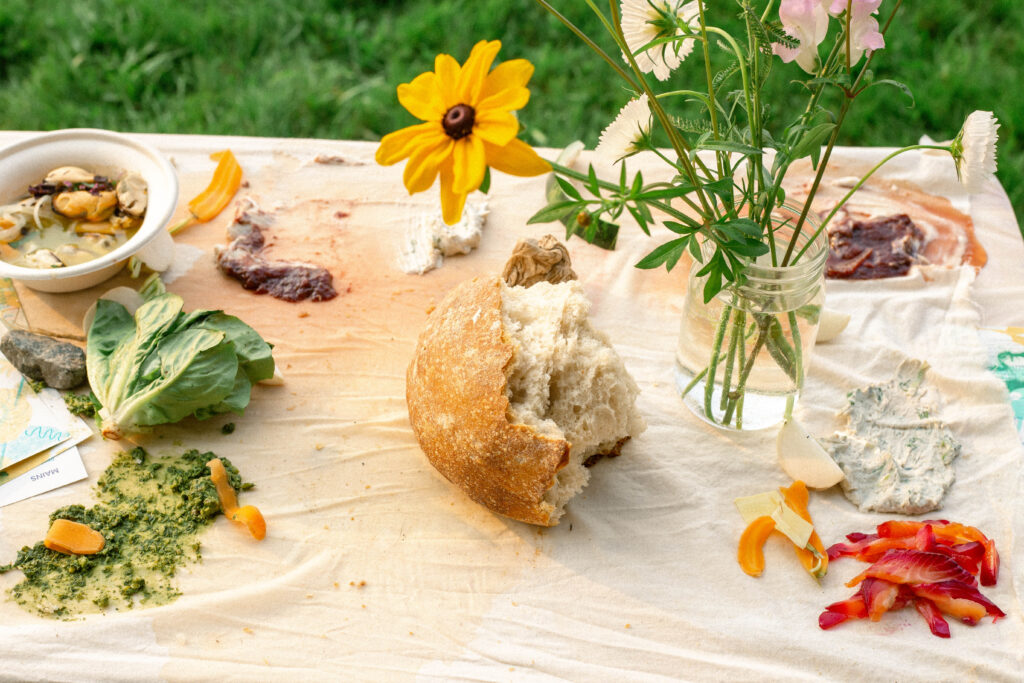
To learn more about fish picnic and Ibsen’s work, visit her website and Instagram.
Image credits: Madeline Harris

